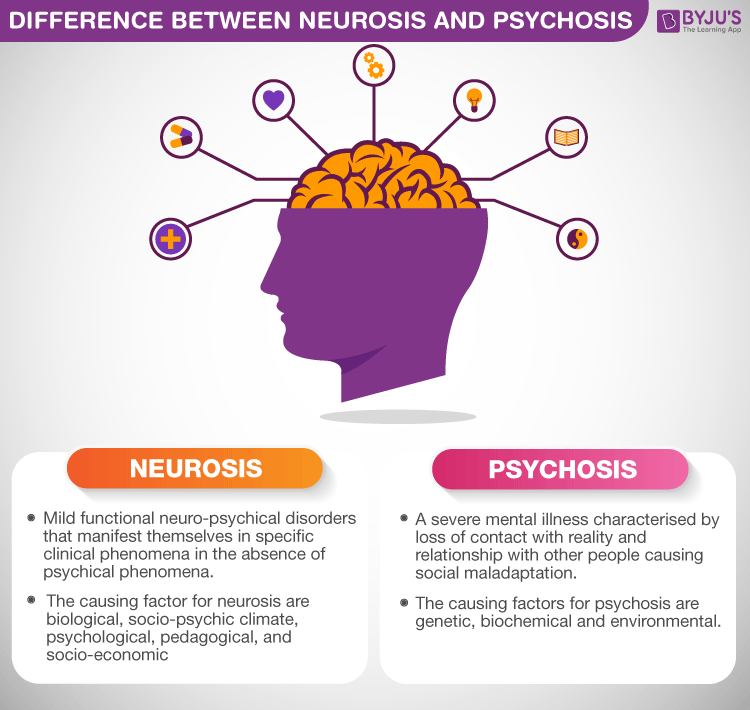
Neurosis and Psychosis are different types of mental disorders.
Neurosis is a mild mental disorder NOT arising from organic diseases – instead, it can occur from stress, depression or anxiety.
Psychosis is a major personality disorder characterised by mental and emotional disruptions. It is much more severe than neurosis – often impairing and debilitating the affected individual.
Difference between Neurosis and Psychosis.
The following are some major differences between psychosis and neurosis.
| Neurosis | Psychosis |
| Mild functional, neuro-psychical disorders that confirm themselves in specific clinical phenomena in the absence of psychical phenomena. | A severe mental illness characterised by loss of contact with reality and relationship with other people causing social maladaptation. |
| Doesn’t affect personality | Affects personality |
| The contact with reality is partially lost | The contact with reality is completely lost |
| Hallucinations and delusions are not present (or extremely rare if present) | Hallucinations and delusions are present |
| Low risk of self-harm | Higher risk of self-harm |
| Obsessive-compulsive disorders, Somatoform disorders, Depression and Post-traumatic disorders are a few types of neurosis. | Schizophrenia and delusional disorders are a few types of psychosis. |
| The causing factor for neurosis are biological, socio-psychic climate, psychological, pedagogical, and socio-economic. | The causing factors for psychosis are genetic, biochemical and environmental. |
| The treatment is usually psychological and medicines can also be prescribed. | Psychosis is treated by antipsychotic medicines, psychological therapy, social support. |
Visit BYJU’S, to learn more differences like the difference between epidemic and pandemic.

very informative
Nice difference
Hi! I have a question, WHY PEOPLE WHO HAVE THIS MENTAL DISORDER ARE PRONE TO COMMIT A CRIME? Thank you and Stay safe whoever you are.
This untrue. In the updated DSM 5, APA doesn’t identify ‘danger’ as a criterion for diagnosis of mental disorders. Recent research has highlighted that people living with mental conditions are not more likely to commit crimes and be a danger to oneself or others when compared to psychologically healthy persons. To emphasize on this, I’ll quote Burns (2010), dangerousness is more of an exception than the rule when it comes to diagnosing mental disorders.